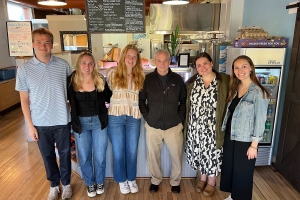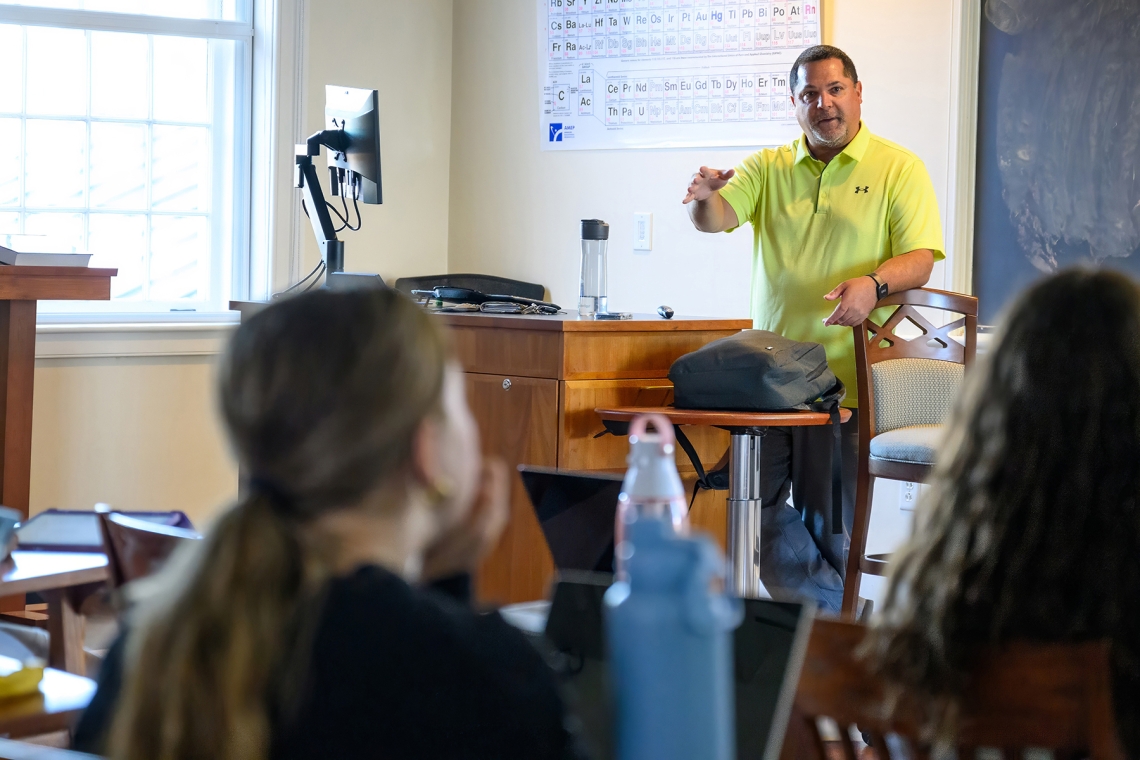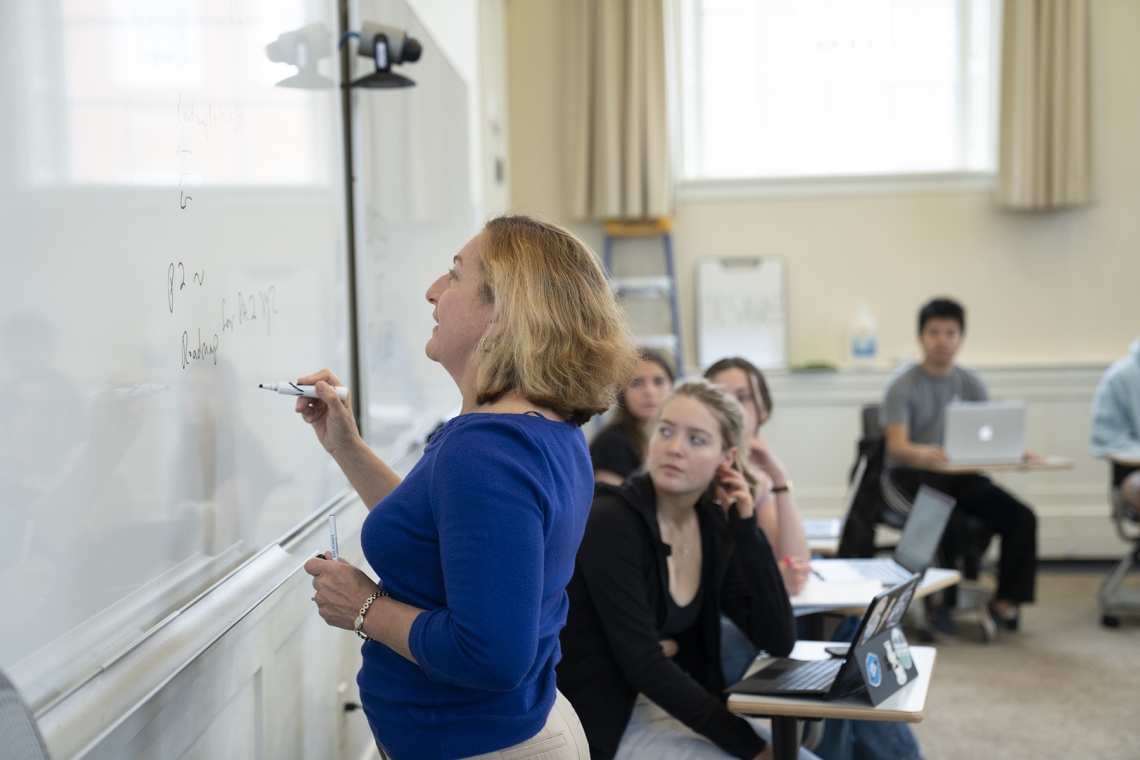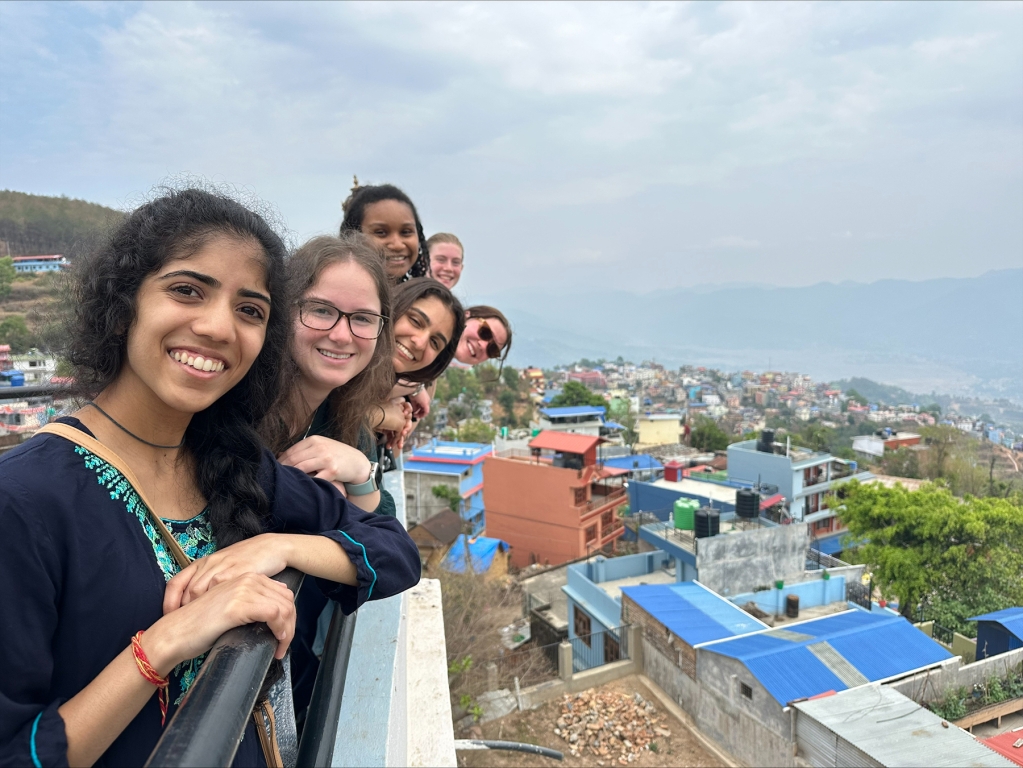
Minor Focus: Law, Justice and Society W&L's Law, Justice and Society minor examines legal concepts from an interdisciplinary lens.
“One of the distinctive things that we do is have classrooms with undergraduates and law students in the same room.”
~ Tim Lubin, Jessie Ball duPont Professor of Religion
The Law, Justice and Society (LJS) minor at Washington and Lee University provides an interdisciplinary framework for understanding legal concepts, institutions and their social impact. The minor, which hosts 20 to 30 students from various majors at any given time, began offering courses in 2019.
The program has faculty representation from various departments, reflecting a broad interdisciplinary engagement with legal topics across the university. Kevin Crotty, professor of Classics, holds a J.D. and Ph.D. and has taught a course on Roman law. Nydia Ayala, assistant professor of cognitive and behavioral science and the first core faculty member in cognitive science in the program, focuses her research on witness decision making on police identification procedures. Jessie Ball duPont Professor of Religion Tim Lubin, who teaches courses about the intersection of religion and law and serves as LJS program chair, said this increased collaboration and interaction among faculty enhances an already mutually beneficial relationship between the undergraduate campus and law school and offers students the opportunity to take courses that deepen their perspective on law.
“One of the distinctive things that we do is have classrooms with undergraduates and law students in the same room,” Lubin said. Undergraduates have the opportunity to take courses in the Law School and participate in its clinics. Law students can take courses from undergraduate faculty, such as professor of philosophy Melina Bell’s courses on jurisprudence and Lubin’s courses on legal pluralism and law and religion.
“This is extremely rare in law schools,” Lubin said, adding that the approach to these courses is much different than what law students at other institutions might experience. “While many law schools offer a course on law and religion or some variation on that title, it’s going to be almost entirely focused on the First Amendment, on jurisprudence and how the courts have dealt with these issues in the United States, whereas ours is set up to be a much more comprehensive and comparative format.”
The minor requires an introductory seminar, LJS 101: Introduction to Law, Justice and Society, which explores fundamental legal questions and introduces key concepts across legal traditions. Subsequent elective courses offer diverse approaches. LJS 230: Separation of Powers in the U.S. Constitution examines constitutional structures and the administrative state. JOUR 280: Covering Courts and the Law provides journalism students with skills to report on legal proceedings. Courses on specialized topics like “should race matter?” or “intellectual property law” tackle complex issues within jurisprudence, ethics and social impacts. To complete the minor’s capstone requirement, students can either undertake independent research, mentored by faculty and culminating in a substantial paper and a formal oral presentation, or engage in an experiential project, which involves shadowing law students in the law school’s clinical programs, which offer legal aid to the community while completing reflective documentation and a final presentation.
Beth Belmont, clinical professor of law and director of experiential education at the law school, said the experiential aspect of the LJS program provides an immersive and practical learning environment for both the LJS students and the law students. For the LJS students, the experience bridges the gap between the undergraduate curriculum and the realities of law school and legal practice. For the law students, the experience provides an opportunity to deepen and reflect upon their development as lawyers through mentorship of the undergraduates.
“The goal of the experiential capstone is for undergraduate students to observe and be engaged as deeply as possible with the work of client representation while developing those skills themselves through simulation and reflection,” Belmont said. “Through problems assigned in the seminar portion of their capstone, the undergraduate students simulate both the lawyering role and the client role. This dual experience, coupled with reflection assignments about what they experience in the clinics, provides the students with important insights into the work of lawyering while ensuring that they also start to develop a sense of the significance of client-centered practice.”
Nathan Dean, assistant professor of law, justice and society, teaches the LJS 101 introductory course as well as a popular course on affirmative action. Dean said that while many students enter the program with a strong interest in attending law school, the program offers a broader perspective on how legal issues impact their lives.
“I’ve often joked that they come for the law, and I give them the justice in society,” Dean said. “The program ends up being more interdisciplinary and philosophical than they expected.”
Camille Ramos ’26, a cognitive and behavioral science major who plans to attend law school, said her coursework in the LJS minor has provided valuable, practical experience and insight into the law school experience.
“Taking a law school course as an undergraduate puts you in the classroom with law students and creates the mindset that you want to be better, grow and learn from them,” Ramos said, adding that the opportunity to take Dean’s course on affirmative action term was an invaluable opportunity to contextualize social and political issues by examining case studies.
“I’ve read opinions from Supreme Court justices in one case and then an opinion from that same justice in another case where they came to a very different conclusion, and you can begin to see why they think as they do, how they ultimately decide things and understand how it applies to current cases or issues being discussed in the news,” Ramos said, adding that the opportunity to have these conversations with peers from diverse disciplines as well as expert faculty is one for which she is thankful.
Hannah Nolton ’25, an economics and Spanish double major with an LJS minor, is currently applying to law school at W&L and other schools around the country. She said her experiences in the LJS program have significantly shaped her interests in environmental law and child advocacy. She credits a journalism class on courts and covering the law, which involved observing a trial, for deepening her interest in the latter. Nolton said she has had ample opportunity to pursue her interest in environmental law from different angles, most notably through an environmental law course offered in the law school. Nolton’s final project in the class revolved around sustainable development in Nepal; she said research for the project proved to be excellent preparation for the Spring Term Abroad course in Nepal she then embarked on with Lubin and Shika Silwal, associate professor of economics, titled ECON/REL 246: Caste at the Intersection of Economy, Religion and Law, for which she received credit in both the economics major and LJS minor. Nolton said she has leveraged her experiences in the program to develop a well-rounded skill set and understanding of how to advocate effectively for vulnerable populations.
“Where else could I have done a program like this that would involve the opportunity to go to Nepal and so thoroughly prepare me for the day-to-day experience of law school?” said Nolton, who is looking forward to completing her experiential capstone next term.
Estrella Burks-Parra ’23, a politics and theater double major with an LJS minor, said the minor was integral in setting her on her path to pursuing her dreams after W&L.
“The LJS minor allowed me to take courses at the law school, allowed me to work in the Immigration Rights Clinic and provided me with a network of both pre-law and current law students to support me on my journey.”
Burks-Parra considered multiple minors, but LJS’ interdisciplinary nature coupled with experiential learning opportunities such as spending her capstone working in a law clinic won out. Her Intro to LJS class with Belmont made clear she made the right choice.
“We always had a wide array of opinions and personalities in class, which made for some of the most intellectually stimulating debates,” she said. “From discussing how to have an equitable jury, various ways to interpret Supreme Court decisions and discussing the different ways to approach our legal system, each class was filled with both laughs and thought-provoking questions.”
Burks-Parra currently serves as admissions coordinator at UVA’s Batten School of Leadership and Public Policy, overseeing admissions into two minor programs and helping with graduate recruiting. She began her M.A. in communication studies with an emphasis in organizational leadership through the University of Alabama this summer and plans to attend law school in the fall of 2025. Burks-Parra said the LJS program provided experiences that helped solidify her career choice.
“Getting to work in the Immigrant Rights Clinic as a part of my capstone was by far the most impactful experience,” said Burks-Parra. “Not only was I able to contribute to solutions needed for these real cases, I also got to witness client depositions and court hearings and had law school mentors willing to answer any questions I had about the law school experience. During this capstone experience, I also got to run point on a simulation asylum case. While it was a lot of work, it was one of the most fun projects I worked on at W&L. I have always loved bringing my creative theater background into fields like law and politics through innovative thinking and problem-solving. This capstone allowed me to do just that. These experiences were not only impactful in confirming this is the field I want to be in but also in knowing that I could support individuals within our community who needed legal help.”
Burks-Parra said that W&L’s emphasis on creating opportunities for students to blend their diverse academic interests was invaluable to her.
“W&L allowed me to explore my interests from national security to intelligence, while also encouraging me to take courses in musical theater, dance and the history of ghosts,” Burks-Parra said.
Margaret Witkofksy ’24, a religion major and LJS minor, concentrated her religion major on religion and law and had Lubin as her adviser for both her major and minor. She said she developed an interdisciplinary perspective on social and community-based issues as she wove together her interests in ecology, religion and law. Her coursework ultimately inspired her to pursue graduate studies that could further explore the connections between religion and environmental stewardship. Witkofksy is now pursuing a Master of Arts in religion at Yale Divinity School with a concentration in religion and ecology and hopes to engage with environmental protection work after graduation.
“The social perspective of the LJS minor – its focus on community and society – connects well with my current academic interests in religion and ecology,” Witkofsky said.
Lubin said the interdisciplinarity of the student experience in the LJS program is truly a hallmark of W&L’s unique academic environment.
“We have a formula here that would be hard to replicate elsewhere,” Lubin said.
 Nathan Dean, assistant professor of law, justice and society, teaching in Payne Hall
Nathan Dean, assistant professor of law, justice and society, teaching in Payne Hall Melina Bell, professor of philosophy, teaches courses in the LJS program.
Melina Bell, professor of philosophy, teaches courses in the LJS program. Hannah Nolton ’25 (second from left) and her classmates in Nepal on their Spring Term Abroad experience.
Hannah Nolton ’25 (second from left) and her classmates in Nepal on their Spring Term Abroad experience.
You must be logged in to post a comment.